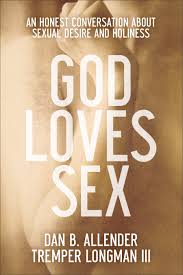 Dan B. Allender and Tremper Longman III, God Loves Sex: An Honest Conversation about Sexual Desire and Holiness (Grand Rapids, MI: Baker Books, 2014). Paperback / Kindle
Dan B. Allender and Tremper Longman III, God Loves Sex: An Honest Conversation about Sexual Desire and Holiness (Grand Rapids, MI: Baker Books, 2014). Paperback / Kindle
God Loves Sex is two books in one.
The first is a theologically and psychologically informed exposition of the Song of Songs. Eschewing centuries of allegorical interpretation, Allender and Longman argue that the Song is “a collection of related erotic love poems that emphasizes the goodness of sex.” They work their way through the Song topically rather than sequentially, highlighting what the Song says about desire, beauty, sexual play, the struggle for intimacy, and the glory of sex. The authors situate the Song’s celebration of sex within the broader biblical teaching regarding the sanctity of marriage. And in a concluding chapter, they note how the Song’s “poems help us understand God’s love of pleasure and play, his commitment to remain faithful to us even when we are adulterous, and finally that he loves to see human beings flourish and grow in fruitfulness and joy.” Thus, even as they eschew an allegorical interpretation of the Song, they find spiritual meaning within it.
The second book in God Loves Sex is the fictional story of Malcolm, a young single man and recent convert to Christianity who joins a small group that is studying the Song of Songs in a fashion similar to Allender and Longman’s exposition of it. Malcolm relates his story through journal entries that the authors place before and after each chapter of exposition. The spiritual journey he relates is one of deepening Christian commitment that goes hand in hand with his journey from sexual brokenness to wholeness. Some readers might be shocked by Malcolm’s references to extramarital sex and drug use, not to mention the use of alcohol by Christians in the small group. These things happen both before and after Malcolm becomes a Christian, though overall there is a clear trend line toward chastity and sobriety. As an ordained Pentecostal minister, I wouldn’t be surprised to find some churches deciding against to use God Loves Sex because of references to these practices, especially by churches that emphasize God’s instantaneous deliverance of people from sinful habits and teach total abstention from alcoholic beverages. On the other hand, some readers might see in Malcolm’s story a realistic portrayal of their own struggles and find, as Malcolm does, that Scripture—especially the Song of Songs—teaches a better, more truly life-giving way to think about and pursue sexual intimacy.
What I most appreciate about God Loves Sex is the authors’ attempt to open up “an honest conversation about sexual desire and holiness,” in the words of the book’s subtitle. Christians teach the sinfulness of sex outside of marriage. But too often, this “no” to sin leaves little room for a “yes” to sex inside of marriage—and not just the sexual act itself, but all the desires, emotions, conversations, and actions that surround the act, making it even more enjoyable, and contributing to the happiness and wellbeing of a husband and wife. There is more to sex than sex, in other words, precisely because that is the way God made men and women.
If so, then sexual desire and holiness cannot be separated in the life of believers. God Loves Sex—both the exposition and the fictional story—show what an integrated sexual holiness might look like. And how such holy sexuality always points beyond itself to the God who created us as sexual beings.
P.S. If you found my review helpful, please vote “Yes” on my Amazon.com review page.

